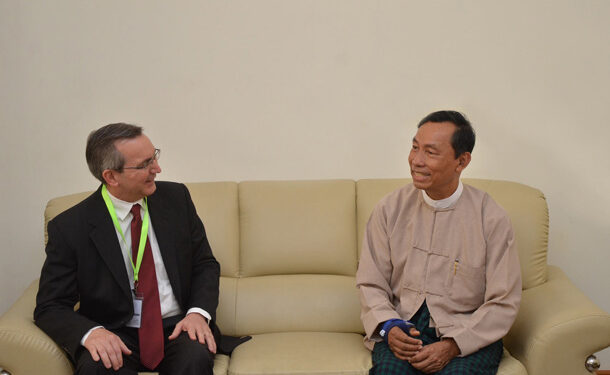RANGOON — Shwe Mann, chairman of an influential legal review committee and former member of the military ruling elite, warned new US Ambassador to Burma Scot Marciel to be “careful” about using a term that “the Myanmar people can’t accept,” during a meeting in the capital Naypyidaw on Wednesday.
The term in question is “Rohingya,” referring to a largely stateless Muslim minority residing in western Arakan State. The Burmese government and much of the population do not recognize the right of the persecuted minority to self-identify as Rohingya, instead labeling them “Bengalis,” implying that they are illegal immigrants from neighboring Bangladesh.
Shwe Mann’s words represent a marginally stronger—but consistent—stance to that of Aung San Suu Kyi, state counselor and minister of foreign affairs, who last week asked the US Embassy not to use the term after nationalist protesters demanded that her National League for Democracy (NLD) government condemn the use of “Rohingya” by members of the international community in Burma.
During the Naypyidaw meeting, Shwe Mann talked about a recent protest in front of the US Embassy in Rangoon. He said it was “caused by the use of a term that is not accepted by Myanmar citizens.”
On April 28, hundreds of Burmese nationalists, and a contingent of monks from the ultra-hardline Buddhist association Ma Ba Tha, staged a protest outside the US Embassy to condemn the American’s mission use of “Rohingya” in an April 20 statement offering condolences and expressing concern after at least 21 internally displaced Muslims died when their boat capsized near Sittwe, the Arakan State capital. The protesters contended that “there are no Rohingya” in Burma.
Shwe Mann told the ambassador to “be mindful” of using a term capable of sparking such conflagrations.
Shwe Mann is considered a close ally of Suu Kyi, and has fallen substantially out of favor with both the military and the retired military elite of the Union Solidarity and Development Party (USDP), including former President Thein Sein.
In August last year, Shwe Man was ousted as the USDP acting chairman in an internal party coup. Then on April 22, Shwe Mann received a letter of expulsion from the party after he was appointed by the NLD to the chairmanship of the Legal Affairs and Special Issues Commission, an influential body tasked with reviewing laws and assisting parliamentary committees. He is still fighting his expulsion.
Marciel began his tenure as ambassador in Burma last month, succeeding Derek Mitchell, who was appointed in 2012 as the first US ambassador in the country since 1990.
“If you proceed carefully around such issues, the relationship and a level of collaboration between Myanmar and America will be much improved,” Shwe Mann said, according to a post on Shwe Mann’s Facebook page about the meeting.
According to the Facebook post, Marciel said he had used the term because there was no alternative—not because he wished to stand against or disrespect the Burmese people’s wishes.
“In the future, I will be careful about using terms that displease the Myanmar people,” the ambassador was quoted as saying in Shwe Mann’s Facebook post.
A day before this Naypyidaw meeting, Marciel was asked about the embassy’s position in the aftermath of the Foreign Affairs Ministry’s request, during his first meeting with the media and civil society groups in Rangoon.
“They get to choose what they want to be called,” he said at the event, referring to the Rohingya. “That’s a fundamental international practice and we respect that. That’s been our approach and it will continue to be our approach.”

















